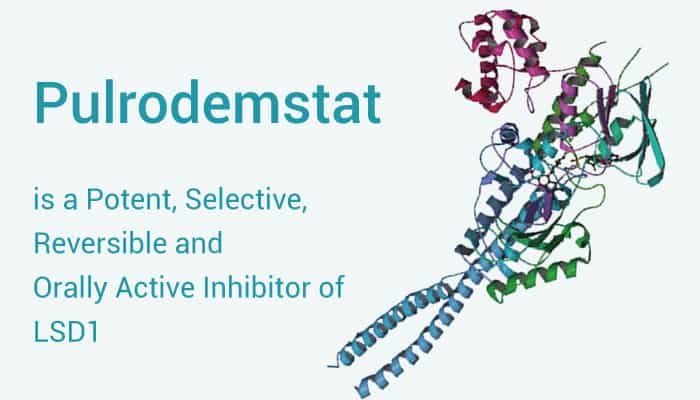Lysine-specific histone demethylase 1A (LSD1) also known as lysine (K)-specific demethylase 1A (KDM1A) is a protein in humans that is encoded by the KDM1A gene. LSD1 is a member of a broad family of monoamine oxidases that requires FAD as a cofactor to catalyze demethylase activity. In addition, LSD1 catalyzes demethylation at histone 3 lysine 4 methyl 1/2 (H3K4me1/2) resulting in a transcriptional epressive state. However, LSD1 can also demethylate H3K9me1/2 to act as a transcriptional activator in certain cellular context. LSD1 is vital in regulation of mammalian biology. Dysregulation and overexpression of LSD1 are hallmarks of a number of human diseases, particularly cancers that are characterized as morphologically poorly differentiated.

Pulrodemstat (also known as CC-90011 or LSD1-IN-7) is a potent, selective, reversible and orally active inhibitor of lysine specific demethylase-1 (LSD1; KDM1A). While, Pulrodemstat is less enzymatic inhibition against LSD2, MOA-A, and MAO-B. In addition, Pulrodemstat has potent anticancer activity. For example, this compound induces acute myeloid leukemia (AML) and small cell lung cancer (SCLC) cells differentiation. Moreover, Pulrodemstat also induces cellular differentiation of poorly differentiated and highly metastatic SCLC. Pulrodemstat shows potent induction of on-target cellular differentiation marker CD11b in THP-1 cell line. And it shoes antiproliferative activity in AML kasumi-1 cells. In vivo, Pulrodemstat (5 mg/kg; oral administration) inhibits tumor growth in patient-derived xenograft SCLC models. Furthermore, Pulrodemstat results in robust downregulation of GRP mRNA levels and maximum suppression of GRP in a SCLC human tumor xenograft (H1417) mice.
In summary, Pulrodemstat is a potent, selective, reversible and orally active LSD1 inhibitor, with anticancer effects.
[1] Toufike Kanouni, et al. J Med Chem. 2020 Dec 10;63(23):14522-14529.